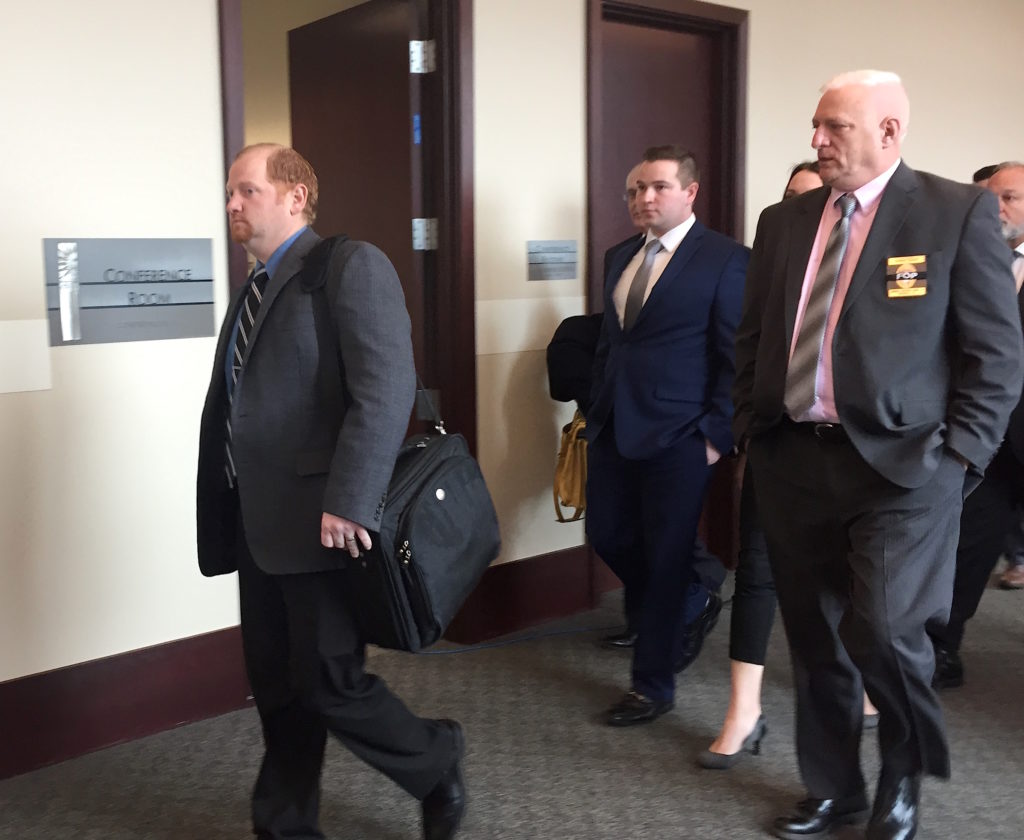
Indicted Nashville police Officer Andrew Delke returned to court Tuesday — and briefly answered a few questions — as attorneys argued over pre-trial matters.
A Nashville grand jury indicted Delke last month on a charge of first-degree murder in the fatal shooting of 25-year-old Daniel Hambrick in July.
With the case now in Davidson County’s criminal court, attorneys are already sparring. And the latest developments show they’re preparing for close scrutiny of the case, which is the first murder prosecution against an on-duty city officer.
Officer Wants To Keep Defense Attorneys
Delke spoke briefly in court Tuesday to make clear that he wants to keep his current defense attorneys.
Prosecutors had questioned whether the officer understood a possible conflict of interest with his legal team.
Attorney David Raybin represents both Delke and the local Fraternal Order of Police — and that officers’ union is paying for Delke’s defense.
But Delke, questioned by Raybin, said he was able to choose which specific attorneys he wanted.
“Do you have any problems with us representing you, even though we are being paid for by the Fraternal Order of Police?” Raybin asked.
“I do not,” Delke said.
“And do you understand that we’ve explained to you multiple times that our duty of loyalty is to you and you alone, and only you can tell us what to do?”
“Yes.”
The matter appeared to be quickly settled. Davidson County District Attorney Glenn Funk said he wanted Delke on the record so that he could not later claim that he wasn’t aware of the conflict.
Less certain is what Judge Monte Watkins will say about a possible conflict with Delke’s other attorney, John M.L. Brown, who simultaneously represents Delke and several other police officers who could testify.
Funk, the prosecutor, said the officers could face moments when they are being questioned on the witness stand and would like legal guidance, but that such advice would come from the very attorney, Brown, who is at Delke’s side.
“There could be some logistical issues, just the optics of the case … if they’re asked who their lawyer is and they point to Mr. Delke’s lawyer,” Funk said.
In court, Raybin argued to allow Brown to stay on the case, noting he’d “never seen any case law” to support Brown being removed. Raybin also said he’d handle questioning of any officers who are entwined with Brown.
More:
Read Funk’s filing (
PDF) and Raybin’s response (
PDF)
The judge said he’d issue a written ruling by early next week.
Records Battle Pits Funk Against Himself
The attorneys have also tussled over
whether evidence and records should be publicly available before the trial. The defense says they should be sealed; the prosecution has argued for openness.
In a written argument (
PDF), Raybin, the defense attorney, detailed how Funk has himself argued to keep records sealed in other high-profile cases, so as not to influence jurors or witnesses.
Funk successfully pushed to seal records in the 2013 Vanderbilt football player rape case and defended that move all the way to the Tennessee Supreme Court, which in 2016 largely agreed that making pre-trial discovery materials public could jeopardize the right to a fair trial.
Raybin questions why Funk has now taken the opposite stance, and he leaned on the Supreme Court while arguing Tuesday.
“Discovery is between the parties,” Raybin said. “But apparently in Nashville we still do it the old-fashioned way, just because that’s the way we’ve always done it.”
The defense attorney said he doesn’t want the jury pool tainted, which could be a reason to try to move the case to another county.
Funk spent less time in front of the judge on Tuesday. He noted that more than 3,000 cases per year have discovery materials filed in the clerk’s office — with the exception of cases involving child victims or rape victims.
Public Attention Is High
Recent legal moves and court hearings also show the high interest in Delke’s trial, and a simmering effort to shape public opinion.
For example, the Fraternal Order of Police announced a public campaign to support Delke, drawing a response from Funk, who called their effort one of “misinformation.”
Exiting court on Tuesday, Delke was flanked by members of the FOP — while family members of Daniel Hambrick have also turned out in force for the hearings.
Leaving court last week, Hambrick family attorney Joy Kimbrough offered her assessment of the case.
“We’ve all seen the film. We’ve seen the tape. We know what he did,” she said, “and I guess that’s typical that he’d come in here and say ‘not guilty.’ “
While video evidence of the fatal shooting is central to the case, the defense team has tried to chip away at the quality of the footage.
Raybin has questioned why Funk publicly released the video before Delke was arrested. And at a preliminary hearing, he called witnesses who emphasized that there are up to 3 seconds when Hambrick and Delke were off-camera, and that the frames-per-second from one camera may not have captured subtle movements.


